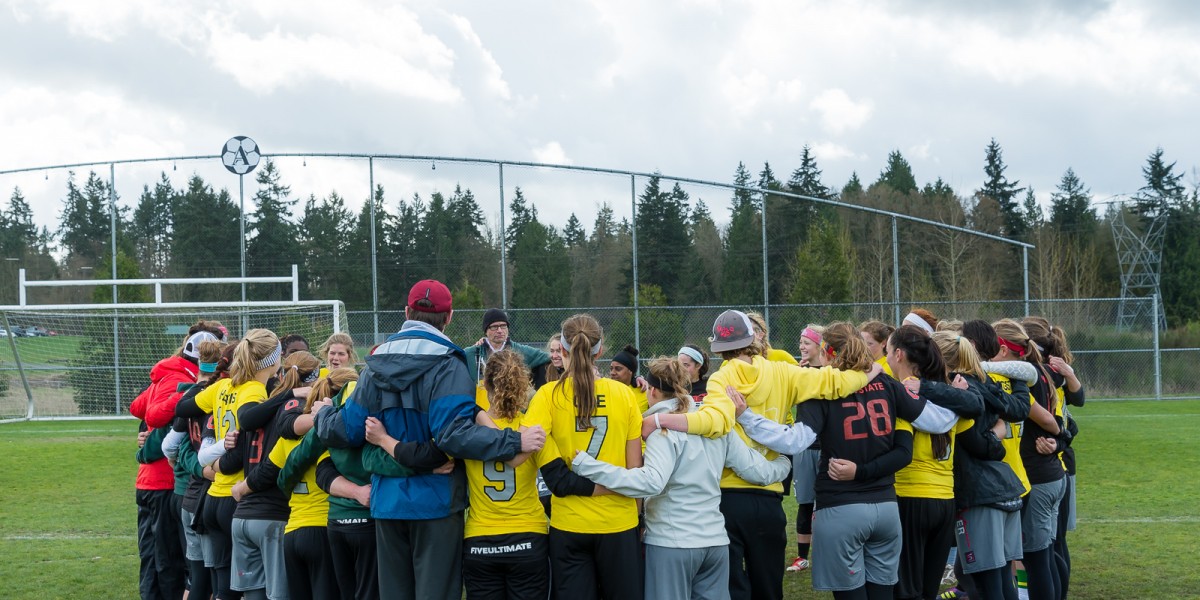 Tino Tran - TinoTran.com
Tino Tran - TinoTran.com
This past weekend, NW Challenge wrapped up the first half of the season. Congrats to Ohio State for winning soundly. There’s a lot to like about this team: they’re big and fast, they compliment their two great throwers with consistent disc skills from the rest of the team and they play their best ultimate against the best teams. Also, congrats to British Columbia for quietly going 6-1; you don’t want to sleep on this team. They’ve gotten steadily better over the course of the season and their strength lies in their system. They aren’t just relying on Mira to do all the work for them, so when she does it’s from a really strong base.
I’ve strayed from my real goal, which was to talk about the Spirit circles that followed every game. After the Carleton accident, Kyle Weisbrod and I were talking about doing something for Syzygy and his idea was to build on the incredible sense of community that followed the accident by doing Spirit circles. I was enthusiastic, but a bit unsure. I haven’t done Spirit circles since Worlds in 2002; I’m not sure how much experience there was from the players themselves. Some of the players had done them with U-23 and U-19, but the general vibe I got was one of uncertainty – what exactly are Spirit circles for?
The general US view on Spirit circles is that they, like song-cheers, are a relic of the hippy-dippy dawning of ultimate and have no practical use in modern ultimate. There was a certain amount of that at NWC – teams often ended by playing reindeer games like Wa! or Look Up Look Down. We (Oregon) played some reindeer games, but we also tried something different – we tried to use the circles as a way to have real and meaningful conversations with the other team. Our first game was against Carleton and even though we had a lot of important stuff to say to them about the accident and about our finals from last year, we flubbed the whole thing and really said nothing. After that we decided that if we were going to screw up in the Spirit circle at least we’d go strong. Then they got much, much better.
Spirit of the Game needs tending; it won’t take care of itself without work. Spirit circles can be a useful tool for doing that work. Even at their most hippy-dippy, they build relationships between teams. They provide a forum for meaningful dialogue about SotG and the tone of the game just played. They hold teams accountable to their opponents – teams that end up walking down the dark road often do so in isolation – it is much harder to be a jerk when you have to stand arm-in-arm and talk afterwards.
Here are my suggestions for making Spirit circles a useful tool:
- Go strong. If there is something to be said, say it. Oregon played a game that was quite chippy in the early going because of some weird call situations that came up. We talked about it in the Spirit circle, even though it is uncomfortable to do so.
- Decide who is going to do the talking for your team. It doesn’t have to be a captain, but it should be someone who is thoughtful and eloquent.
- Discuss briefly before the circle what you want to say and what you think the relevant issues are.
- Not every Spirit circle is going to be a crazy intense conversation about Spirit. That’s good. SotG works just fine 99% of the games that are played, so 99% of the Spirit circles will be pretty bland. These are often the most awkward.
- Tournament directors need to build the time into the schedule for these to happen.
Washington, Oregon and British Columbia pledged to continue doing Spirit circles the rest of the season; I hope the other teams from NWC continue as well. I’m not exactly sure how this will work or what it will look like, but I am confident that it is good and useful work.
~~~~~~~~~~
If you haven’t been paying attention to the struggles of the Northwestern football team, you should. If we’re going to chase legitimacy through conventional channels, we should par careful attention to what we are actually chasing. It isn’t all bright lights, big city.










Comments Policy: At Skyd, we value all legitimate contributions to the discussion of ultimate. However, please ensure your input is respectful. Hateful, slanderous, or disrespectful comments will be deleted. For grammatical, factual, and typographic errors, instead of leaving a comment, please e-mail our editors directly at editors [at] skydmagazine.com.